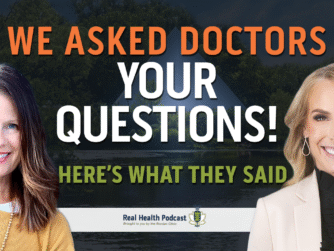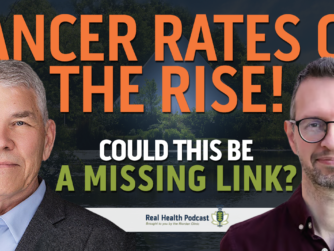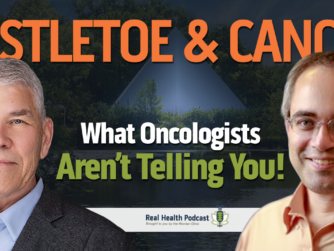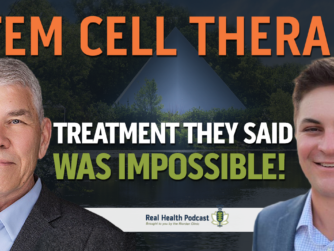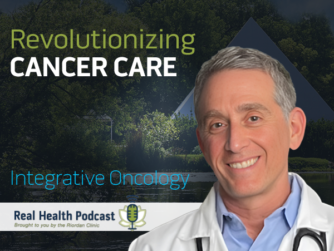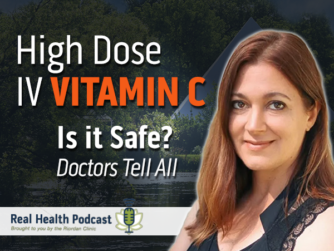In this episode of the Real Health Podcast, we welcome back Dr. Kirsten West, ND, LAc, FABNO—an integrative oncology expert at Riordan Clinic—alongside special guest Jenn Nolan, BS, MS, ONC, TAP, owner and oncology nutrition consultant at Remission Nutrition. Together, they address your questions and share valuable insights from their experience supporting patients through integrative cancer care.
Thanks to This Episode’s Sponsor
Riordan Clinic Nutrient Store: https://store.riordanclinic.org/
Links
Learn more about the hosts:
Dr. Kirsten West, ND, LAc, FABNO : https://riordanclinic.org/staff/kirsten-west-nd-lac-fabno/
Jen Nolan: https://www.remissionnutrition.com/jennolan
Learn more about Riordan Clinic: https://riordanclinic.org/
Interested in becoming a Patient: https://riordanclinic.org/request-an-appointment/
Disclaimer: The information contained on the Real Health Podcast and the resources mentioned are for educational purposes only. They’re not intended as and shall not be understood or construed as medical or health advice. The information contained on this podcast is not a substitute for medical or health advice from a professional who is aware of the facts and circumstances of your individual situation. Information provided by hosts and guests on the Real Health Podcast or the use of any products or services mentioned does not create a practitioner-patient relationship between you and any persons affiliated with this podcast.
Read the Transcript
00:00:02:21 – 00:00:23:22
Narrator
This is the Real Health podcast brought to you by Riordan Clinic. Our mission is to bring you the latest information and top experts in functional and integrative medicine to help you make informed decisions on your path to real health. Today’s episode is going to be the first in a special two part series called An Integrative Approach to Thriving Through Cancer.
00:00:23:24 – 00:00:50:03
Narrator
This heartfelt conversation features our own doctor, Kirsten West, and Jenn Nolan, the owner of Remission Nutrition. Together, they answer real questions submitted by you, our Riordan Clinic patients, social media followers and health hunters. Newsletter readers. In this first episode, Doctor West and Jen dive into some of the most common questions about integrative oncology nutrition during treatment and how to support your body physically and emotionally through a cancer journey.
00:00:50:05 – 00:00:51:13
Narrator
Let’s get started.
00:00:51:15 – 00:01:18:07
Dr. Kirsten West, ND, LAc, FABNO
Hi everyone! Welcome to the Real Health podcast. I’m Kirsten West and this is Jen Nolan. And, I work at the Riordan Clinic as part of the integrative oncology team. We work as a team to really support people’s health. Their terrain. Help them get well and be healthy. And it takes a village. Which is why I have my dear friend and colleague Jen here with me.
00:01:18:09 – 00:01:22:24
Dr. Kirsten West, ND, LAc, FABNO
And so we’re going to be answering some questions that we got in from patients.
00:01:23:01 – 00:01:53:18
Jen Nolan
Thank you. I’m really excited to be here. I’m Jen Nolan and I’m an oncology nutrition consultant and owner of Remission Nutrition and we help people. We work virtually. We help people worldwide. And we work with folks that are going through a cancer journey, whether they’re preventing cancer, whether they are, in remission or have just recently been diagnosed or family members.
00:01:53:20 – 00:02:18:15
Jen Nolan
We also work with people who are really looking to uplevel their health, their metabolic health. So that’s really important. And, you know, our the reason why we’re here is because collaboration is so important. And it’s always such a great honor when we get to work with your patients and send our clients to a Reardon clinic and so I’m just really excited for us to have this conversation.
00:02:18:15 – 00:02:51:21
Dr. Kirsten West, ND, LAc, FABNO
Yeah, it’s been great. And Jen and I have known each other for a while now, and have shared a lot of patients together. And since that time, we’ve also developed a really strong friendship and clinical relationship. And it’s, it’s it’s a blessing. So I’m so happy to be here with you today. So, we did receive quite a few questions from patients who have written in asking about things specific to their own health, to questions that they’ve probably had being on social media or on the internet and seeing the latest fads and cancer, and integrative oncology.
00:02:51:21 – 00:03:10:18
Dr. Kirsten West, ND, LAc, FABNO
So we went through the list. We got so many questions. We’re not going to be able to answer all of them, but we chose the ones that we thought would be the most pertinent to the larger audience, and to help people get a taste of what it is that we do and and what’s important for people to know.
00:03:10:20 – 00:03:27:12
Dr. Kirsten West, ND, LAc, FABNO
And so with that, we can get started with our first question, and our first question that we got in are actually and it was our very first question is, are organic seed oils equally as bad as conventional seed oils?
00:03:27:14 – 00:03:32:02
Jen Nolan
I’m just going to really quickly say that this is also not meant to be medical.
00:03:32:04 – 00:03:32:17
Dr. Kirsten West, ND, LAc, FABNO
In.
00:03:32:19 – 00:03:54:07
Jen Nolan
Any form. So just a little reminder for everyone. But I love the seed oil question. And it’s a constant, you know, conversation that we have with our clients. You know, I don’t think the short answer is yes. The if it’s whether it’s conventionally raised or whether it’s organic, I believe if we want to call it bad. Yes.
00:03:54:07 – 00:04:25:20
Jen Nolan
But there’s a much bigger story to this question. And if we look historically at, you know, kind of what happened with our food supply, seed oils played a big part in that story. So, you know, back in the day, it was, you know, the fats came from animal, they came from lard, they came from butter. And, what happened in about the 50s, early 50s is we started to see this switch.
00:04:25:20 – 00:04:45:22
Jen Nolan
So they started they started to try to figure out what they could do that was more economical. That would last longer on the shelves. So, and I think with there was a bit of a marketing piece that came out and said, look, these, these seed oils are better. And then the fat coming from, you know.
00:04:45:24 – 00:04:55:11
Dr. Kirsten West, ND, LAc, FABNO
Well, this is when people started to worry about cholesterol, right? So people were like, oh, well, cholesterol is an issue. Now, this is something we need to pay attention to. And so we shifted our focus.
00:04:55:11 – 00:05:23:15
Jen Nolan
We did, we did. And I think that again you know, financially it made more sense. And foods could last longer. So they could literally be on a shelf longer. So there became the processed foods industry’s things in boxes and things like that. So, you know, I believe that the issue with these seed oils we’ve found now, research is showing that it’s really probably not heart healthy.
00:05:23:15 – 00:05:44:16
Jen Nolan
Right? So we’re kind of going backwards kind of it backwards in time. The seed oils are really high in what are called omega six fat. Omega six fats are essential. They are essential fatty acids just like omega three fats. But what happens is, you know, again, back in the day we had this ratio of omega threes to omega sixes.
00:05:44:16 – 00:05:53:01
Jen Nolan
Yeah we’re about 1 to 1 right. And now in this sort of standard American diet we’re at 6 to 1 or.
00:05:53:01 – 00:05:53:09
Dr. Kirsten West, ND, LAc, FABNO
One to.
00:05:53:09 – 00:06:25:16
Jen Nolan
- You know and it’s crazy how much more omega six we just get naturally in our foods. And so we’re trying to bring in more omega threes which are the anti-TNF for amateur fats. Omega sixes are pro-inflammatory. So we’re trying to change the ratio. But yeah it’s complicated. It’s about eating fatty fish and visual. Yeah. Right. And so if we can drop our omega sixes by avoiding these omega six rich foods, we’re better off because we can’t get as many omega threes.
00:06:25:17 – 00:06:41:20
Jen Nolan
So I’m always like we need to change that balance. So omega sixes are very inflammatory to the body. They cause oxidative stress. Yeah. Both of these things detrimental for cancer and other disease.
00:06:41:22 – 00:07:06:04
Dr. Kirsten West, ND, LAc, FABNO
We have. And we you know this is a common theme I see in patients. We always check the omega ratios. And I would say about 90% of the people that I see have a skewed omega six to omega three ratio, which has a lot. And that thing that’s so beautiful about it is the body prefers omega threes. So if we can just increase our omega three intake the body’s going to utilize that really quickly.
00:07:06:06 – 00:07:34:04
Dr. Kirsten West, ND, LAc, FABNO
So and that speaks to our physiology that our bodies prefer to not be inflamed if possible. So I think it’s important also to speak to some of the seed oils that we want to be mindful efficacy oils is such a big grouping of oils, but some of the ones we want to be really mindful of are sunflower, corn, canola, cottonseed, soybean, safflower, grape seed, and rice bran oil.
00:07:34:06 – 00:07:42:09
Dr. Kirsten West, ND, LAc, FABNO
Sesame oil is actually okay, but we want to make sure that it has high, low content and is organic.
00:07:42:11 – 00:08:03:02
Jen Nolan
Yes. And, I was really blown away that safflower oil. So I remember when sort of the health foods kind of came into play. Right. And for these like safflower oil stuff or oil, it’s the highest. Yeah. Of those oils that you listed in omega six. So again that is pro-inflammatory. And what do we not want in the body.
00:08:03:07 – 00:08:25:11
Jen Nolan
Right. We don’t want inflammation. So it’s fascinating. And I think that going back to using like what to use them. So when you’re at a restaurant you’re likely going to have some seed oils. That’s what they’re using. It’s less expensive. It’s, you know, easier to use last longer. So you know, you can go to a there’s an app called Seed Oils account.
00:08:25:11 – 00:08:48:03
Jen Nolan
So that’s a really great resource for folks. But also choosing these high quality pasture raised pasture finish finished butter and ghee. Yeah. Get back to that natural food. Olive oil. Coconut oil. Read your labels. So important. And that’s how we can really start to bring down that omega six ratio and increase the omega three.
00:08:48:04 – 00:09:08:20
Dr. Kirsten West, ND, LAc, FABNO
Exactly, exactly. And I think part of the reason not only that whole cholesterol revolution back in the 1950s, which changed our perspective on the types of fats we should be eating, but I think that the lard in the butter also got such a bad rap because of how we started to produce and manufacture and treat our animals in this country.
00:09:08:21 – 00:09:32:11
Dr. Kirsten West, ND, LAc, FABNO
So I think that that was a big piece. The other thing we had talked about last night is that when everyone went dairy free and gluten free, it became almond everything. So it was almond milk. Almond flour and almonds are great, but almonds do tend to have a higher amount of omega six. So as much as we want to, we’re we’re trying to do what’s good for us given the information that we have.
00:09:32:13 – 00:09:36:14
Dr. Kirsten West, ND, LAc, FABNO
But unfortunately it’s not always the right information.
00:09:36:16 – 00:09:47:21
Jen Nolan
So absolutely. Yeah. And I will say that that is where, you know, organic can make a big difference. So if you are going to choose almonds please be sure. Yeah.
00:09:47:21 – 00:09:58:06
Dr. Kirsten West, ND, LAc, FABNO
And it’s not like you have to take out almonds altogether. But you know variety and moderation is the key. We always say that right. Moderation is the key in life. So.
00:09:58:08 – 00:10:13:03
Jen Nolan
Well and I think a the seed oil question, that was a big one to start with because we could talk about it for ever. So there’s a lot that goes into this. And so hopefully that’s helpful. Yeah. Yeah. So should we move to the next.
00:10:13:05 – 00:10:14:16
Dr. Kirsten West, ND, LAc, FABNO
Yeah. Let’s go to the next one.
00:10:14:16 – 00:10:25:09
Jen Nolan
Yeah. Doctor West someone wrote in how does high dose IBC help with prostate cancer.
00:10:25:11 – 00:10:52:20
Dr. Kirsten West, ND, LAc, FABNO
Well it can be very helpful in prostate cancer. But again we want to get away from the myopic approach of one cancer, one treatment. It really needs to be about the person, the individual person, the individual cancer and what specifically is needed in that situation. So with that said, I have seen vitamin C, high dose vitamin C, two incredible things with prostate cancer.
00:10:52:22 – 00:11:14:07
Dr. Kirsten West, ND, LAc, FABNO
Things were a patient. I had one patient who he had done everything from an integrative perspective, had seen lots of other providers. We got him over here, assessed his therapeutic dose of vitamin C, got him going on that, but also reviewed labs and looked at what was going on in his history and to figure out where other imbalances are when we added the high dose vitamin C.
00:11:14:07 – 00:11:38:20
Dr. Kirsten West, ND, LAc, FABNO
On top of that, we started to stabilize the PSA and the PSA actually started to decline, and it was the first time this patient had seen it, and he was on the brink of needing to go into conventional care because he was kind of losing out on next steps. He needed something more aggressive. So that was one case where it was like it really was out of harmony, of getting everything on board and making sure we were testing really needed to test for that person.
00:11:38:22 – 00:12:06:16
Dr. Kirsten West, ND, LAc, FABNO
And we again, we need to remember every person is different and every cancer is different. So the other thing that we know and studies have shown is that vitamin C has redox properties, and it has been shown to decrease cell proliferation and prostate cancer. Now, one of the interesting things here that I like to talk about is that typically when we have people on high dose vitamin C, we also have them taking liposome or vitamin C in between to help keep the blood levels up.
00:12:06:18 – 00:12:25:14
Dr. Kirsten West, ND, LAc, FABNO
Well, one of the issues with life is also vitamin C is it is in a base of choline. And we know that coli may not be the best, especially high amounts of choline kind of a gray area. But they may not be the best for prostate cancer specifically. So that’s where we have to think about the other aspect.
00:12:25:14 – 00:12:33:01
Dr. Kirsten West, ND, LAc, FABNO
So I typically get them on powdered forms of vitamin C in between the IV’s. So but there’s other things we can think about with prostate cancer.
00:12:33:01 – 00:12:52:20
Jen Nolan
There are and we talk a lot about, you know, sort of food as medicine. How can we take advantage of our foods, what we’re putting in their mouth as medicine. And lycopene is a treat. And that comes in tomatoes. A lot of people hear that all the time. Prostate cancer, lycopene or prostate health. So we want to utilize tomatoes.
00:12:53:01 – 00:13:14:02
Jen Nolan
Cherry tomatoes are actually really high in lycopene. So our Roma tomatoes there’s one of my favorite tricks is taking tomato paste and having just even a teaspoon of that a day. You can put it into anything a salad dressing into soup. You can make a little sort of juice with it, with water, lemon juice, salt, pepper.
00:13:14:04 – 00:13:35:02
Jen Nolan
That’s really great. But that can really be helpful. So food is medicine. So there are things other than IVC. I don’t want to just ask you though really quickly, isn’t. So I find with a lot of our clients, they’re sort of running around doing their IVC sort of randomly. And I feel like that’s a big conversation that we have.
00:13:35:04 – 00:13:45:22
Dr. Kirsten West, ND, LAc, FABNO
Yes. And also and that’s actually a really good point to bring up. But on the tomato piece, real quick cooked tomatoes, would you say cooked tomatoes would be better than raw tomatoes for the lycopene.
00:13:45:24 – 00:14:08:10
Jen Nolan
And cooked tomatoes or like I said, in a tomato paste that’s been very cooked down. And with that, yeah. So using some really good butter or really good olive oil. Yeah. And really. Yes. That’s the way that the body’s going to be able to absorb it. So the cooking process will kind of make the, the nutrient, the lycopene, that kind of anti-cancer nutrient more available to right.
00:14:08:12 – 00:14:10:08
Dr. Kirsten West, ND, LAc, FABNO
So and with those fats for sure.
00:14:10:08 – 00:14:11:10
Jen Nolan
And then it can absorb.
00:14:11:10 – 00:14:15:03
Dr. Kirsten West, ND, LAc, FABNO
And I know it sounds weird, but I love a good piece of salmon with red.
00:14:15:03 – 00:14:15:12
Jen Nolan
Sauce.
00:14:15:12 – 00:14:18:18
Dr. Kirsten West, ND, LAc, FABNO
Yeah I think it’s delicious. So great. So yeah.
00:14:18:18 – 00:14:24:03
Jen Nolan
And vitamin C again. Yeah. Vitamin C in those tomatoes as well.
00:14:24:03 – 00:14:39:00
Dr. Kirsten West, ND, LAc, FABNO
Exactly. So we’re getting right. It’s getting out. Yes. So for the vitamin C we don’t just want to be willy nilly about it, you know like oh I’m going to get my vitamin C one time a week. I’m going to. And then in a couple weeks I’ll go and get another, or maybe I’ll get three that week and then take a week off.
00:14:39:06 – 00:15:02:15
Dr. Kirsten West, ND, LAc, FABNO
We really do want to try to keep vitamin C consistent, especially for the first three months of being on it. I always suggest 2 to 3 times a week at those therapeutic levels. And determining the therapeutic levels is important because I think in this country we have this opinion of more is better, but too much vitamin C can actually cause oxidative stress.
00:15:02:15 – 00:15:20:23
Dr. Kirsten West, ND, LAc, FABNO
And we don’t want that either in our patients who are dealing with cancer. So having that therapeutic range, that’s just right. You know, kind of like the Goldilocks is important. And so 2 to 3 times a week for three months, then maybe 1 or 2 times a week for three months, and then you titrate down after that.
00:15:21:00 – 00:15:41:05
Dr. Kirsten West, ND, LAc, FABNO
There has been some clinical experience, and I’m not sure there’s a study done on it yet. That’s something that we could probably do here. But where if you just cold turkey vitamin C, there is a chance you could make if there are cancer cells around, you could make those cells more resistant to treatment. I kind of think of it as someone being on an antibiotic and not finishing the whole pack.
00:15:41:05 – 00:16:07:24
Dr. Kirsten West, ND, LAc, FABNO
You know your doctor says you got to finish your whole Z pack if you’re going to fight this off, because otherwise the bacteria will get resistant. Same thing with vitamin C, you really want to be consistent, start titrating down and have a practitioner who’s going to be monitoring your labs to make sure that it is a time to titrate down, because obviously, if it’s working really well and things are looking good, maybe you stay on it two times a week longer than three months.
00:16:08:01 – 00:16:24:04
Jen Nolan
So there’s a difference between this as a therapeutic and integrative therapeutic approach versus going to an IV. Right. In writing that a lot. Yeah. And so this is really great. Yeah. That’s great. Yeah.
00:16:24:06 – 00:16:52:01
Jen Nolan
I love it. So this is kind of a two part question. We combined two questions that came in about ions. And so this is a high ion diet okay. If labs are showing iron deficiency anemia. And why are cancer patients held off from supplementing with iron. And how is it different than ferritin stores in the body. So it’s kind of a mouthful.
00:16:52:01 – 00:17:31:07
Dr. Kirsten West, ND, LAc, FABNO
Yeah. Yeah okay I’ll take a shot at this. So so first of all a high iron diet is never okay regardless of not having disease having disease cancer autoimmune disease whatever. We don’t want to be getting high levels of iron. We don’t want to be pushing for a high iron diet. However, if someone truly is iron deficient and we can see that with labs, there’s a full lab panel that we can look at, we don’t need to get into all the details here, but if you work with a doctor who’s well versed at reading these labs, most almost all doctors are you can determine if someone is truly iron deficiency anemia anemic, or if it’s
00:17:31:07 – 00:17:52:02
Dr. Kirsten West, ND, LAc, FABNO
anemia of chronic disease. If it is iron deficiency anemia, then yes, you do want to make sure that you’re getting foods that have iron in them. And we both prefer eating foods that have a good iron content rather than supplementing with iron. There are times what you do need to supplement with iron, but we always shoot for foods first.
00:17:52:04 – 00:18:13:20
Dr. Kirsten West, ND, LAc, FABNO
It is the most easily assimilated form. Supplements typically cause you to be constipated. But the other aspect about iron is that if we get too much of it, and this is where the caveat becomes if we get too much of it and someone truly is an iron deficiency anemia because anemia is someone can be anemia anemic, someone can be anemic.
00:18:13:20 – 00:18:35:13
Dr. Kirsten West, ND, LAc, FABNO
And it’s not necessarily iron deficiency anemia, it can be anemia of chronic disease. And in that case, taking iron may actually be a detriment because that body at that point is holding on to more iron. It’s not iron deficiency anemia because you’ll see a high ferritin, which is iron storage, which is part of this question, high 13, which is iron.
00:18:35:18 – 00:19:03:10
Dr. Kirsten West, ND, LAc, FABNO
Iron storage and low red blood cells or hemoglobin. So yes, it looks like there’s anemia, but it’s not due to iron deficiency. There’s other things that you can look at to to to assure that that’s the case. But in not in that situation we do not want to add more iron. And so that’s where we do want to be mindful of refraining from red meat, not using cast iron pans for cooking those types of things.
00:19:03:12 – 00:19:31:21
Jen Nolan
So so if someone’s ferritin is elevated and and or their. Yeah. If their or their iron’s iron is elevated, we want to be really careful with too much iron right. Or cast iron still it’s however if they’re they truly are anemic to iron. We don’t want them taking supplements because of the constipation and all that. Then we can add in these sort of blood building foods, which I always say it kind of sounds gross because it really is the bloody or foods.
00:19:31:21 – 00:19:51:18
Jen Nolan
Right? So we’ll use like I love getting people going on the organ blends. Yeah. So these really great ancestral, you know, meats, they’re awesome. And you can put it into a meatball. You can use it in a, you know, taco bowl and you don’t even know you’re eating organ meats. And cook it maybe in a cast iron skillet.
00:19:51:18 – 00:19:56:18
Jen Nolan
And that can increase the body’s iron stores if we if we know that that that’s.
00:19:56:18 – 00:20:13:00
Dr. Kirsten West, ND, LAc, FABNO
What I mean. They even sell those lucky fish. They call them the lucky fish. You can get them, you can get them on Amazon. But it’s just this iron fish that you throw in your pan with your food and it like, gives you maybe it’s like you to who knows, maybe you’ll get something else from it. But, but the other piece I want to do speak to this.
00:20:13:00 – 00:20:37:18
Dr. Kirsten West, ND, LAc, FABNO
The reason iron is bad is because think about what happens to metals out in the elements. They oxidize, so they rust and they oxidize when that happens in the body, if we have too much of a metal, it causes oxidation, it causes oxidative stress, and that leads to inflammation. And those are two things we do not want to have around, not only with cancer, but with chronic disease in general.
00:20:37:20 – 00:20:54:06
Jen Nolan
I often talk about oxidation, and I could be wrong in this, but it’s like the old school blower. So if you have a fire, a fire going and you want to make it bigger, you use air. Yeah, yeah, it blows up. Yeah. And that’s one of my favorite analogies. Yeah. Thinking about oxy.
00:20:54:06 – 00:21:18:06
Dr. Kirsten West, ND, LAc, FABNO
Yeah. And I seen unfortunately I have seen some patients who are at the late stages of cancer and end up getting an iron I.V. or a bleach, I mean, in some situations, but I have seen them go downhill quickly afterwards. And so it is kind of that same concept. So there’s a whole whole bunch of stuff to iron and cancer.
00:21:18:09 – 00:21:23:06
Dr. Kirsten West, ND, LAc, FABNO
We could go on and on about this one as well. But I think that those are the most important aspects.
00:21:23:08 – 00:21:40:14
Jen Nolan
Yeah. So and it always goes back to the individual absolutely really quickly. This was kind of a cool thing remember. So if somebody is low in iron and we know it we can actually pair with vitamin C rich foods. Oh right. And that yes increase absorption.
00:21:40:14 – 00:22:01:01
Dr. Kirsten West, ND, LAc, FABNO
It helps to increase absorption of iron. The other piece is that if you are too much iron, if you’ve got too much iron on board, you can add black to your foods because that will actually kill iron out. So there’s different ways you can combine foods to orient your iron levels and status the way you want it.
00:22:01:03 – 00:22:05:23
Jen Nolan
So steak plus black tea. Yeah. Yeah. Perfect.
00:22:06:04 – 00:22:08:18
Dr. Kirsten West, ND, LAc, FABNO
Yeah. I love it. Just not at night.
00:22:08:20 – 00:22:09:11
Jen Nolan
Right.
00:22:09:13 – 00:22:11:05
Dr. Kirsten West, ND, LAc, FABNO
Because then you can’t sleep.
00:22:11:07 – 00:22:13:06
Jen Nolan
Yeah. Right. So for breakfast. Yeah.
00:22:13:08 – 00:22:15:18
Dr. Kirsten West, ND, LAc, FABNO
Steak with your breakfast. Perfect.
00:22:15:21 – 00:22:47:12
Jen Nolan
Excellent. So this was another really beautiful question that came in. It was a little bit more of a commentary. This was a wonderful message from a patient of yours who wrote in and she said, 75 years old and, five years out from breast cancer diagnosis and treatment. So she was at her annual oncology appointment a few months ago, and both of her cancer tumor blood tests went up above their always normal number.
00:22:47:14 – 00:23:09:01
Jen Nolan
She said, I’m doing a repeat test next month. I’ve been told this is only 30% accurate. I’m sure if it’s still high, they’ll want to do scans, which I don’t want to do. How can search should I be? I don’t and never have taken hormone suppressants. I had a lumpectomy and radiation and I feel great and high. Doctor West, I’ve missed you.
00:23:09:03 – 00:23:36:16
Dr. Kirsten West, ND, LAc, FABNO
So sweet, so sweet. So this is definitely a case where we need more information. Of course we want to pay attention to tumor markers. If someone has had a history of cancer. But what we also need to remember is that tumor markers are general markers of inflammation as well. And so I have seen in clinical practice where someone has starts to have who’s had cancer starts to have their tumor markers increase for a period of time, and then they start to come down.
00:23:36:18 – 00:23:58:14
Dr. Kirsten West, ND, LAc, FABNO
So it’s normal to see tumor markers kind of do this roller coaster type thing. But it’s when we start to see that trend word up that we get a little nervous, but we still need more information. We can’t just rely on those markers. And this is why we do what we do. And this is why terrain testing, this is why getting a larger picture is so imperative.
00:23:58:16 – 00:24:23:01
Dr. Kirsten West, ND, LAc, FABNO
So in this case, what I would truly recommend would be looking at circulating tumor cell DNA. And we do have these tests out there. Now, what these companies would do or what they do is if there is tissue available from that original tumor, in this case you would have it because she had a lumpectomy. This company will go down and actually track down that tissue and create a fingerprint.
00:24:23:06 – 00:24:45:10
Dr. Kirsten West, ND, LAc, FABNO
They call it a fingerprint of the circulating tumor cell DNA. And they can use that to screen the blood to see if they’re finding any signs of residual disease. So that’s going to be more sensitive than just watching tumor markers because we’re actually looking in the bloodstream to see if there are amounts of circulating tumor cell DNA that are in the systemic circulation.
00:24:45:12 – 00:25:04:08
Dr. Kirsten West, ND, LAc, FABNO
At that point, we can add that to the tumor markers to decide, is this something we do need to be concerned about, or is this something we don’t need to be concerned about? I, I am a big proponent of getting this testing. As soon as someone get surgery, as soon as someone begins their cancer journey, if they have adequate tissue.
00:25:04:10 – 00:25:16:06
Dr. Kirsten West, ND, LAc, FABNO
I think this is an important test to get because again, I think it’s more sensitive than just watching tumor markers. And we can check this every three months and make it a longitudinal test to make sure we’re where we want to be.
00:25:16:08 – 00:25:19:04
Jen Nolan
And are those tests typically covered by insurance?
00:25:19:04 – 00:25:43:02
Dr. Kirsten West, ND, LAc, FABNO
Typically they are. I know we think at this point breast colon, prostate are covered. So that’s a big it’s a big thing. And there are several medical oncologist who are now using these tests as well. So it’s just more information is more power. And God forbid yes, it shows that there’s some circulating tumor cell DNA, but at least it gives us the information to start to do something about it.
00:25:43:02 – 00:25:49:15
Dr. Kirsten West, ND, LAc, FABNO
Instead of going, well, let’s wait another month and get tumor markers again, and hopefully they’re going down at that point.
00:25:49:17 – 00:25:55:05
Jen Nolan
So then I really like what you said in the beginning about the the terrain to assessing all those.
00:25:55:05 – 00:26:14:14
Dr. Kirsten West, ND, LAc, FABNO
Oh, we have to look at everything. Yeah, we have to look at what. And you know, if there is circulating tumor cell DNA around or if the tumor markers are indeed going up due to active cancer, what is happening in the terrain to allow that to happen? Is it blood sugar? Is it immune function? Is it stress? Is it endocrine.
00:26:14:16 – 00:26:23:19
Dr. Kirsten West, ND, LAc, FABNO
And stress is a big one. I mean, we can’t I mean people want to focus on the numbers, but we have to remember that that’s a whole other aspect that’s really big. And in the cancer journey.
00:26:23:21 – 00:26:29:21
Jen Nolan
So that can impact every everything everything just. Yeah. Yeah. Absolutely. Yes.
00:26:29:23 – 00:26:52:13
Narrator
Thank you so much for joining us for part one of an integrative approach to thriving through Cancer. We hope you were able to find it informative, encouraging and empowering. Be sure to come back next week for part two, where Doctor West and Jen continue the conversation with even more practical insights and thoughtful answers to your questions. Until then, take care and be well.
00:26:52:15 – 00:27:12:22
Narrator
Thank you for listening to the Real Health podcast. If you enjoyed this episode, be sure to subscribe and leave us a review. You can also find all of the episodes in show notes over at Real Health podcast.org. Also, be sure to visit Riordan Clinic dot org, where you will find hundreds of videos and articles to help you create your own version of real health.


